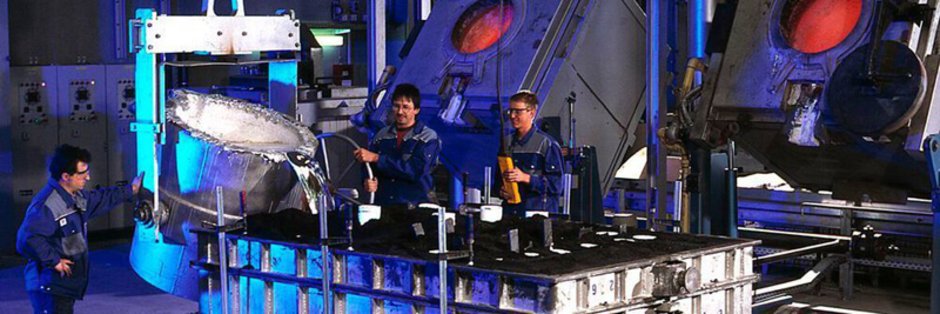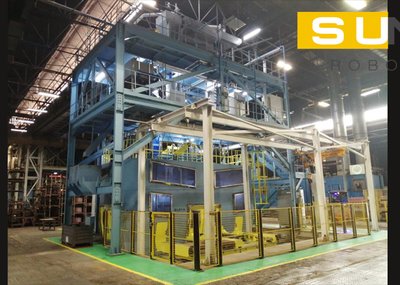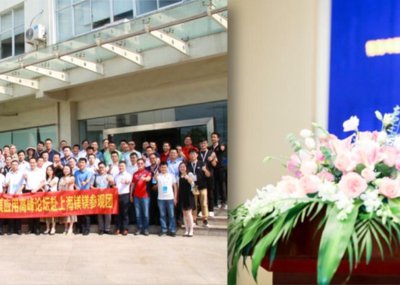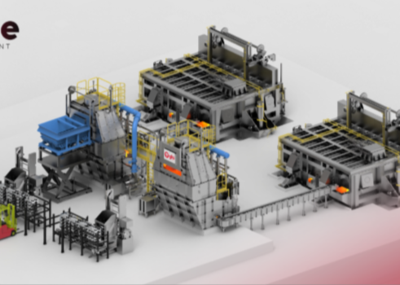Germany — Manufacturing companies in many sectors are currently struggling with supply bottlenecks for essential semi-finished products, starting materials and raw materials.
The Blöcher Foundry can fabricate large blow moulds, deep-drawing moulds and foaming moulds made of aluminium with dimensions of up to 2,000 x 3,000 meters and unit weights of up to 2.5 tons within just a few weeks.
Even solid aluminium ingot material for the machining production of large blow moulds, deep drawing or foaming tools can currently only be procured at high prices and sometimes with long delivery times. The Blöcher foundry is stepping into the breach here and now supplies numerous toolmakers with high-precision, tempered moulds made of cast aluminium. Thanks to innovative additive manufacturing systems and large-scale milling technology, even geometrically complex tools can be produced in record times.
A CNC Styropor large-scale milling machine, a robot-assisted 3D sand printer and extensive know-how in the fields of stainless steel tube processing and aluminium casting are the core competencies with which the Blöcher foundry can score points with many toolmakers these days.
The reason: Especially toolmakers who, for example, used machining technology for the production of large blow moulds or foaming tools lack the correspondingly dimensioned aluminium ingot material for this purpose. It is currently enormously expensive and difficult to procure. The reasons for this range from US sanctions to the pandemic-related transport and supply chain disruptions. In searching for ways out of this supply dilemma, more and more mouldmakers are now rediscovering aluminium casting as a cost-effective and quickly feasible alternative.
“The first concrete call for help of this kind reached us a few weeks ago from other European countries. However, by now, word must have gotten around that we can provide even sophisticated cavities with complex, near-contour tempering for casting large blow-moulded or foamed components in just a few weeks. Inquiries for our services are currently increasing significantly,” reports company boss Jürgen Blöcher.
Trend-setting technologies
The Blöcher foundry is probably one of the most modern aluminium foundries in Germany and has recently positioned itself as a fast on-demand supplier through numerous investments. While at the turn of 2018/19, the company commissioned another hall and a sizeable five-axis milling machine for the CNC production of large models (8,000 x 4,000 x 2,000 mm) made of expanded polystyrene (EPS), 2020 the go-ahead was given for a fully automated 3D sand printer for the additive production of large casting moulds made of modified quartz sand. In addition, the Blöcher foundry has a 3D CAD design and a 3D scanner for geometric quality assurance of the EPS models. “The intelligent interaction of these technologies alone enables us to implement a high degree of process efficiency even in the preliminary foundry stages and to reduce the time required significantly,” emphasises Jürgen Blöcher.
The Blöcher foundry completed and delivered the first of these particularly urgent aluminium casting tools in just three weeks after the customer provided the 3D CAD data. These were primarily large cavities of complex geometry with close-contour cast-in tempering to produce complete truck interior linings from pressed moulded parts. The customer, a medium-sized company in Eastern Europe, used to manufacture these moulds exclusively by machining. However, the current emergency and the short delivery time for the aluminium casting tools led to a change in thinking.
The switch to aluminium casting, as we practice it in Biedenkopf, also goes hand in hand with a learning effect for many toolmakers. Not only that, they realise how quickly a casting tool is available today and how cost-effective it can be. "Jürgen Blöcher"
According to Jürgen Blöcher, this is quite symptomatic for large parts of the industry: “The technical advantages offered in practice by stainless steel tempering cast into the cavities are also becoming increasingly important again,” says Jürgen Blöcher. The company boss is alluding to a shortcoming of machined moulds that often only becomes apparent after they have been used for a longer time: the tempering channels machined directly into the solid block material utilizing deep-hole drilling often have acute-angled bends and dead spots in which sludge pockets can form, which as harmful hotspots make controlled cooling of the mould difficult or impossible. In addition, many cooling water additives attack the aluminium surfaces in the temperature control channels over time, which also leads to process-related problems. “In the case of the stainless steel tube tempering of the aluminium casting moluds, which is expertly and harmoniously inserted into the cavities, these difficulties do not occur.”
Source: www.etmm-online.com Editor: Alexander Stark






